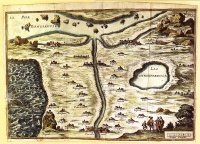Imaginary voyage
From The Art and Popular Culture Encyclopedia


|
"A little beyond this, we got into a sea, not of water, but of milk; and upon it we saw an island full of vines; this whole island was one compact well-made cheese ... The vines have grapes upon them, which yield not wine, but milk." --A True Story (2nd century) by Lucian "Voyager, c'est bien utile, ça fait travailler l'imagination. Tout le reste n'est que déceptions et fatigues. Notre voyage à nous est entièrement imaginaire."--Journey to the End of the Night (1932) by Louis-Ferdinand Céline "It is a curious fact that of that class of literature to which Munchausen belongs, that namely of _Voyages Imaginaires_, the three great types should have all been created in England. Utopia, Robinson Crusoe, and Gulliver, illustrating respectively the philosophical, the edifying, and the satirical type of fictitious travel, were all written in England, and at the end of the eighteenth century a fourth type, the fantastically mendacious, was evolved in this country."--1895 edition of Baron Munchausen "The classical works of Pliny and Mela, on which the student had to depend, were full of scraps of romance, taken from some Syrian story about Thule, or some imaginary voyage out of the Caspian Strait towards the cannibals beyond ...'--The Career of Columbus (1892) by Charles Isaac Elton |
|
Related e |
|
Featured: |
Imaginary voyage is a kind of narrative in which utopian or satirical representation (or some popular science content) is put into a fictional frame of travel account.
Contents |
History
It's very archaic narrative technique preceding romance and novelistic forms. Two known examples from Greek literature are Euhemerus' Sacred History and Iambulus’ Islands of the Sun. Their utopian islands are apparently modeled from mythological Fortunate Isles.
Lucian's True History parodizes the whole genre of imaginary voyage, and in his foreword Lucian cites Iambulus as one of objects of parody. Photius states though in his Bibliotheca that its main object was Antonius Diogenes' The incredible wonders beyond Thule, a genre blending of fantastic voyage and Greek romance which popularized Pythagorean teachings.
The first to revive this form in the Modern era was Thomas More in his Utopia (1515), to be followed a century later by proliferation of utopian islands: Johannes Valentinus Andreae's Reipublicae Christianopolitanae descriptio (1619), Tommaso Campanella's The City of the Sun (1623), Francis Bacon's The New Atlantis (1627), Jacob Bidermann's Utopia (1640), Denis Veiras' The history of the Sevarambi (1675), Gabriel de Foigny's La Terre australe connue (1676), Gabriel Daniel's Voyage du monde de Descartes (1690), François Lefebvre's Relation du voyage de l’isle d’Eutopie (1711), as well as many others.
Lucian's satirical line was exploited by François Rabelais' Gargantua and Pantagruel (1532) and developed later on in Joseph Hall's Mundus alter et idem (1607), François Hédelin's Histoire du temps (1654), Cyrano de Bergerac's Histoire comique contenant les États et Empires de la Lune (1657) and Fragments d’histoire comique contenant les États et Empires du Soleil (1662), Charles Sorel's Nouvelle Découverte du Royaume de Frisquemore (1662), Margaret Cavendish's Blazing World (1666), Joshua Barnes' Gerania (1675), Bernard de Fontenelle's Relation de l’île de Bornéo (1686), Daniel Defoe's The Consolidator (1705), and most notably in Jonathan Swift's Gulliver's Travels (1726).
Imaginary voyage has become a natural medium for promoting new astronomic ideas. First literary space flights after Lucian were: Juan Maldonado's Somnium (1541), Johann Kepler's Somnium (1634), Francis Godwin's The Man in the Moone (1638), John Wilkins' The Discovery of a World in the Moone (1638), Athanasius Kircher's Itinerarium extaticum (1656), David Russen's Iter lunare (1703), Diego de Torres Villarroel's Viaje fantástico (1723), Eberhard Kindermann's Die geischwinde Reise auf dem Luftschiff nach der obern Welt (1744) - the first flight to planets, Robert Paltock's The life and adventures of Peter Wilkins (1751), Voltaire's Micromégas (1752).
Pages linking in as of 2022
British literature, Fortuné Méaulle, Georges Méliès filmography, History of science fiction, Itinerarius of Johannes Witte de Hese, List of appearances of the Moon in fiction, List of writing genres, Nautical fiction, Russian science fiction and fantasy, Terra Australis
Literature
- Fantastic voyage, in: Encyclopedia of Science Fiction, ed. by John Clute, 1993
See also

